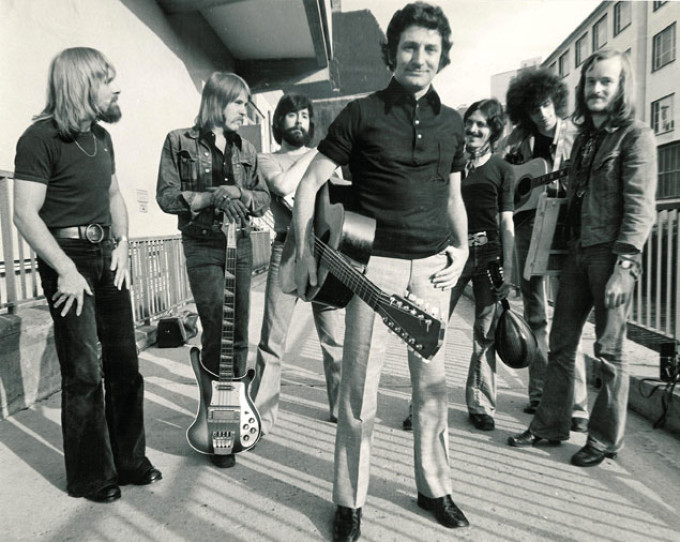
On September 30th we will add “Lonnie Donegan Meets Leinemann” to our Collectors Premium series.
In the 70’s LEINEMANN were an integral part of the so-called “Hamburger Szene” which was founded at Onkel Pö’s Carnegie Hall. And it became its home base. Udo Lindenberg, the Rentnerband and also comedians like Otto Waalkes, Willem or Truck Stop made music from Hamburg famous across city borders. The combination of Northern German slang, the cheeky and dry humour, fast rhythms and memorable refrains plus a few beers made for a good time. So going to the “Hamburg fish market” after a long night of drinking became a certain tradition among hip students. After a small and fishy breakfast everyone went to the Jazz Morning Pint where you would listen to old time jazz, blues, boogie woogie and also skiffle. And when it came to skiffle you could not avoid coming across songs of this man: LONNIE DONEGAN.
Donegan (in our picture the timeless elegant frontman) was the “King of Skiffle” and the first popstar of the post war era, so to speak. In this barren time, the Brit with Scottish roots conquered the hearts of young teenagers with his simple and happy sound which combined blues, folk and dixiejazz. Some of his greatest hits are songs like “Rock Island Line”, “Don’t You Rock Me Daddy-O” or “Puttin on the Style”. Leadbelly’s cocaine blues “Have A Whiff On Me” newly arranged and tempo accelerated, it became the popular hit “Have A Drink On Me”. This song was ideal for pubs because not everyone had radio or TV which was the reason why music was predominantly performed live.
Teenagers started following his role model and started building their own instruments from tea crates and washboards and founded bands. Skiffle-Kids who later became international music icons, were not only the Beatles, Van Morrison, Ronnie Wood, Mick Jagger, David Gilmour, Jimmy Page, Cliff Richard but also The Who and Roger Daltrey. The latter also said in an interview with the English music magazine “Mojo”: „Without tea chests, washboards and Lonnie Donegan there would be no My Generation…”. Later, Skiffle was replaced by rock’n’roll and beat.
But let’s not get ahead of ourselves. Ulf Krüger, washboard king and “Leineman” from the very beginning, wrote a wonderful and detailed historic document, in which he describes his time during the high times of skiffle and how Leinemann and Lonnie Donegan found together.
